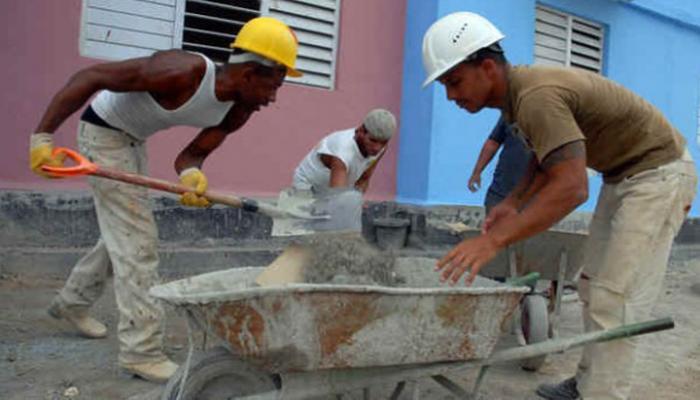Journalists at RHC have been monitoring the economic implications of the United States blockade of the island ever since estimates were made available and as the years roll by, the effects of the blockade on sensitive, specific areas of Cuban society have emerged with painful clarity. One such sector is the construction industry in Cuba.
Maribel Robaina, Planning and Statistics at the Ministry of Construction, or Micons said these figures are really up to date. From April 2013 to 31 March 2014, the economic and financial blockade affected the construction of houses and social work in the sector to the tune of $27.7 million dollars. Of this amount, $ 26.7 million relate lack of access to more efficient and productive American housing technologies.
The remaining million reflects additional costs of shipping and air for more distant markets as an alternative.
Robaina also said very recently the agency would have invested the entire $27.7m in the repairing or building of homes, schools, and clinics.
Other construction experts, such as Mario Larrinaga, have detailed products essential to the housing industry, that cannot be acquired in the North American market. These include an array that runs from bathroom furniture, through electrical equipment, to false ceilings.
That’s not all. The Investment Director of the National Housing Institute, Roberto Vasquez, has widened the picture pointing out that given the lack of access to modern technology, the country is forced to continue using obsolete materials demands more resources and are less productive.
The Cuban government has announced a series of measures this week aimed at restructuring the country’s current housing system and authorizing the building of dwellings on roofs, empty lots and State-owned land by the population.
The special issue of Cuba’s Official Gazette published this past Friday made public the new State Decree Law 322/2014, that substantially modifies the General Housing Law, in effect since 1988. It seeks to simplify the applications by citizens to request changes of address, the transfer of properties and individual construction work.
To quote from the legislation, signed by President Raul Castro on July 31, it aims to “improve State housing services and reorganize housing-related activities, reassigning these to entities responsible for work hitherto governed by the National Housing Institute., the INV
This restructuring will involve the transfer of the INV’s chief functions to the Urban Planning Institute (IPF), presided over by General Samuel Rodiles Planas, and to other State entities.
The Official Gazette also published seven complementary resolutions aimed at making the issuing of permits to the population more efficient, improving regional and urban organization and combatting illegal practices and construction work. The legislative package will come into effect on January 5, 2015.
The State will assign lands to individuals or entities who request these for the building of homes, certifying that completed dwellings are habitable, approving procedures for technical reports used to value properties and transfer ownership of empty lots and flat roofs
The Urban Planning Institute (IPF) will regulate the sale, purchase, donation and exchange of empty State lots. It will be empowered to assign State lots to individuals in need for the building of homes. The lot assigned will have to meet basic urban planning requirements, and individuals may begin construction on these immediately.
The Council of State Decree reads: “The Municipal Urban Planning Office, in cases approved by the Municipal Administrative Council and in accordance with the priorities established by the State, will be authorized to transfer ownership of State lots to individuals through the pertinent payments, giving these full rights over these properties, so that they may build homes in their jurisdiction, through the procedure to be established by the President of the Urban Planning Institute,”
People who are assigned a State lot will be required to begin construction there within a year from purchase. Failing this, authorities will either extend the building permit for an additional year or decide to terminate the agreement, returning the amount paid.
Those affected by natural disasters, people living in precarious conditions, welfare cases, those residing in State shelters or in earthquake or disaster-risk areas will be prioritized in the assignation of State lots.
Similarly, the transfer and use of flat roofs for the expansion of homes, through purchases and other mechanisms, has been made more flexible.
The section reads: “The owners of individual dwellings, dwellings located in buildings with several stories, where each story constitutes a single dwelling, and dwellings that are part of an apartment building, may, of mutual agreement, grant the owners of dwellings on the top floor the right to expand their homes, or grant a third party the right to build a new dwelling, in the flat roof of the building in question, provided it is technically feasible and does not violate any urban or regional regulations, following authorization from the Provincial Urban Planning Office.”
These measures are aimed at alleviating Cuba’s housing deficit, calculated at 600,000 dwellings, and at encouraging individual construction efforts. According to official figures, only 26,634 new homes were built last year, the lowest figure registered since 2004. The most significant detail, however, is that nearly half, that is 12,217 units, were built by the population, unaided by the State.
Related Articles
Commentaries
MAKE A COMMENT
All fields requiredMore Views
- U.S. lawmakers propose withdrawing from United Nations, saying it no longer serves Washington's interests
- Brazil announces dates for BRICS summit
- Indigenous leader and political prisoner Leonard Peltier released after nearly 50 years in prison
- Cuban president congratulates new head of African Union Commission
- Rubio is from the USA, not Cuba


